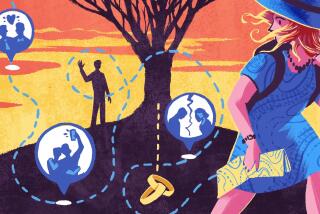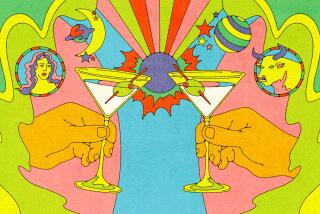Love’s elusive end, harmony
LOVE is an unruly emotion, an uneasy alliance of joy, grief, anger, loneliness and a longing that is rarely fulfilled. Born white hot, it either mellows to a state of warm cocoa or chills into a form that is harsh and distant, like an iceberg drifting out to sea.
I sing today of a love grown cold and a love rediscovered, and the extremes of reaction that each position engenders. I write of love in a time of youth and love in a time of e-mail.
My Teengirl’s romance evaporated to those rhythms of her age that seem to make all things temporary. Anger and distress marked the cooling of a bond with her high school sweetheart as they grappled with the confusions of their youth, the increasing demands of blossoming adulthood and the insistent requirements of higher education.
Love based on maturity endures many hardships, clinging to the edge of relationships with the tenacity of a rock climber. If it is simply a diversion on the way to self-realization, it passes like a butterfly in a breeze, trailing far behind the upward journey of the teenager. At 19, our Teengirl is watching it go.
I’m not certain what split our granddaughter from her boyfriend. There are dynamics at work in the physiology of the young that are difficult, if not impossible, to compute. Their rivers run backward, their emotions lack gravitational stability, their highs are low.
We sat looking out at the ocean one evening, just she and I, in a restaurant along the shoreline, and I tried talking to her about the terrible pain of love, and the relief of pain that time provides. I talked to her about the real love that would come, as it came to me, and the jarring ride along the road to discovery.
She listened but there was a distance to her attention, as though her mind and her heart were elsewhere. Her eyes shone with tears but she didn’t cry. A slight smile dwelt on memories of other times.
As it happens, the following day I was with the little girl next door who had grown into womanhood with a despair of her own that was ended by, of all things, an online dating service. I’m not sure whether EHarmony seeks dates or higher forms of relationship for its members, but it worked into an extraordinarily happy marriage for Jodi and Mark Chamberlain.
She was Jodi Johnson when they lived in a house just over the fence from us. Ambitious and hardworking, she earned two master’s degrees and married her college professor, gave birth to a girl, worked as a teacher and seemed happy. But the happiness and the commitments of marriage faded after 20 years, and they were divorced.
A relationship that followed some time later was short-lived. Oddly, we were at a dinner party at Jodi’s home the night the split occurred. She was in tears, suddenly coping again with a detachment that seemed almost unbearable. It’s what Teengirl is enduring. There is isolation in emotional solitude, even in crowds. Loneliness is a silent companion.
Jodi found EHarmony just about the time it was discovered by Mark Chamberlain, also in his 40s, and twice divorced. Its founder is psychologist-author Neil Clark Warren, the sweet-smiling TV pitchman whose persuasive efforts manage to combine the commercial skills of a televangelist with those of a low-key mattress salesman.
Both Jodi and Mark took the online psychological tests that defined their character and their desires. “It wasn’t about looks or money,” Jodi says. “I didn’t even have a photo of myself to send in.” Their tests established an amazing match. They e-mailed each other. They talked on the telephone. And then they met.
EHarmony has critics. Some online reviewers who have tried it belittle it on websites intended to evaluate dating services. But it worked for Jodi and Mark. They even look the perfect couple. She’s blond, pretty and ebullient. He’s dark-haired, handsome and soft-spoken. And their first date indicated from the start that they were also emotionally right for each other.
“I knew she was special from her e-mails and phone calls,” Mark says. “And when I met her, I was crazy about her.”
Jodi: “As we were leaving Shutters [an oceanfront restaurant in Santa Monica], Mark said he wasn’t a verbal person, but he wanted me to know how he felt about me. He hugged me and said, ‘Do you know what I mean?’ I said, ‘Yes.’ ”
Their first date was on April 12, 2004. Ten months later they were engaged. Two months after that, they were married. Jodi continues to teach at Pierce College. Mark is national sales manager for Barclays Global, an asset management firm. The three -- including Jodi’s daughter, Gillian -- live in the Santa Monica Mountains.
No one has ever been able to predict the route that love will take. It assumes many forms and takes many directions. I sense that the connection between Jodi and Mark is firm. Mark says, “It feels like we were married in another life.”
It’s a lesson for our Teengirl. What seems like the end is likely only prelude to a beginning. Sadness is an emotion that softens the soul. I know how painful the termination of a first love can be. I asked Teengirl if she thought they could still be friends. She replied, “I’m not sure we ever were.”
Oh, love. Oh, youth.
*
Al Martinez’s column appears Mondays and Fridays. He can be reached at [email protected].


